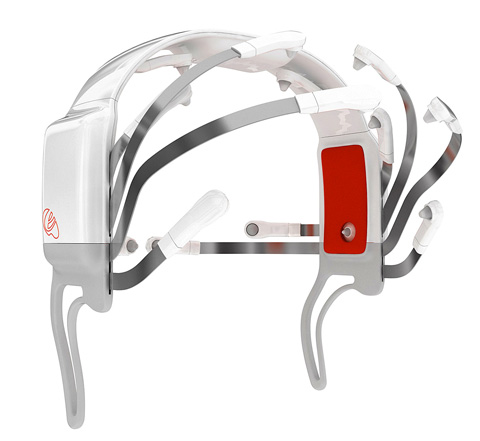It’s mind over machine: a US high-tech company has created a headset allowing computer game lovers to use their thoughts to move mountains and make objects disappear on screen.
Emotiv, a San Francisco-based startup that marries neuroscience and computer engineering, says its EPOC gaming headset offers only a glimpse of what the technology has to offer.
“There is no natural barrier from what we can see,” Emotiv co-founder Tan Le said while demonstrating the headset in the firm’s office.

PHOTO: AFP
“This is the tip of the iceberg for what is possible for us. There will be a convergence of gesture-based technology and the brain as a new interface — the Holy Grail is the mind.”
Gamers will be able to get their hands on the gadget in time for the winter holiday season, the company says.
The EPOC headset features 16 sensors that press against a user’s scalp to measure electrical activity in a brain using electroencephalography. A built-in gyro tracks head movement.

PHOTO: AFP
The sensors also register users’ moods and facial expressions, merging the data in computer software that “learns” to match readings with what people are thinking, according to Le.
“There is a direct correlation between thought and what happens on screen,” Le said. “It really fulfills this long fantasy people have had of moving objects just with thought.”
A video game will be included with the headset when the package goes on sale for US$299 at the Emotiv Web site and select shops.
The martial arts fantasy game has a rural Asian setting. An animated “master” leads players through exercises that include lifting mountains with their minds.
A test of the headset showed that after “training” the EPOC system for less than a minute one could spin, push, pull and lift objects onscreen, or make them vanish, by simply thinking about it.
“Gamers are early adopters of technology and thought control is the ultimate fantasy of gamers,” Le said.
Emotiv has a software development kit available to videogame makers as well as programmers of “anything that involves a human and a computer” including those involved in virtual worlds, cars and medical care.
The technology could be used to let virtual world characters referred to as “avatars” reflect the real-world expressions and moods of the people they represent online, according to Emotiv engineer Marco Della Torre.
The kit for third-party software savants to weave thought-control into programs has reportedly been downloaded from the Emotiv Web site more than 1,000 times.
“We have a lot of Fortune 500 companies interested,” Le said.
Even law enforcement agencies have expressed interest in the headset’s ability to read people’s minds.
“It certainly could be used as a very accurate polygraph,” Le said. “If you have seen something before, there is no hiding it. There is brain recognition.”
Medical applications could include giving stroke victims or people in comas new ways to communicate.
People wearing headsets while listening to online music could have tunes automatically tagged based on whether they made them happy, sad, excited, or bored.
Le, an Australian telecommunications entrepreneur named Young Australian of the Year in 1998, said the idea for the headset sprang from a chat about brains and technology during dinner in 2003.
Le and fellow entrepreneur Nam Do founded Emotiv with neuroscientist Allan Snyder and computer chip designer Neil Weste.

May 18 to May 24 Pastor Yang Hsu’s (楊煦) congregation was shocked upon seeing the land he chose to build his orphanage. It was surrounded by mountains on three sides, and the only way to access it was to cross a river by foot. The soil was poor due to runoff, and large rocks strewn across the plot prevented much from growing. In addition, there was no running water or electricity. But it was all Yang could afford. He and his Indigenous Atayal wife Lin Feng-ying (林鳳英) had already been caring for 24 orphans in their home, and they were in

On May 2, Chinese Nationalist Party (KMT) Chairman Eric Chu (朱立倫), at a meeting in support of Taipei city councilors at party headquarters, compared President William Lai (賴清德) to Hitler. Chu claimed that unlike any other democracy worldwide in history, no other leader was rooting out opposing parties like Lai and the Democratic Progressive Party (DPP). That his statements are wildly inaccurate was not the point. It was a rallying cry, not a history lesson. This was intentional to provoke the international diplomatic community into a response, which was promptly provided. Both the German and Israeli offices issued statements on Facebook

President William Lai (賴清德) yesterday delivered an address marking the first anniversary of his presidency. In the speech, Lai affirmed Taiwan’s global role in technology, trade and security. He announced economic and national security initiatives, and emphasized democratic values and cross-party cooperation. The following is the full text of his speech: Yesterday, outside of Beida Elementary School in New Taipei City’s Sanxia District (三峽), there was a major traffic accident that, sadly, claimed several lives and resulted in multiple injuries. The Executive Yuan immediately formed a task force, and last night I personally visited the victims in hospital. Central government agencies and the

Australia’s ABC last week published a piece on the recall campaign. The article emphasized the divisions in Taiwanese society and blamed the recall for worsening them. It quotes a supporter of the Taiwan People’s Party (TPP) as saying “I’m 43 years old, born and raised here, and I’ve never seen the country this divided in my entire life.” Apparently, as an adult, she slept through the post-election violence in 2000 and 2004 by the Chinese Nationalist Party (KMT), the veiled coup threats by the military when Chen Shui-bian (陳水扁) became president, the 2006 Red Shirt protests against him ginned up by